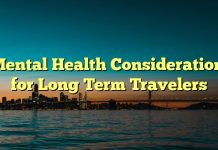Navigating Healthcare While Living Abroad: A Comprehensive Guide
Understanding the Basics of International Healthcare
For anyone setting out on an international adventure, whether for work, study, or a change of scenery, healthcare often remains an afterthought until it becomes a pressing need. Living abroad introduces a host of challenges, and healthcare is a key aspect that requires careful planning and understanding.
Why Healthcare is Crucial for Expats
Healthcare is more than just treating illnesses; it's about maintaining your well-being and ensuring access to quality medical services when needed. The unpredictability of life, especially abroad, means you must be prepared for anything from minor ailments to serious emergencies. Understanding the healthcare system in your host country can greatly reduce anxiety and ensure you’re well-supported.
Differences in Healthcare Systems Worldwide
Healthcare systems vary dramatically worldwide. Some countries boast robust public systems with extensive coverage, while others rely heavily on private healthcare. Developed nations often provide high-quality care, but even within these countries, the system can be complex, like the insurance-driven model in the United States versus the universal care found in countries like Canada or the UK.
Preparing for the Move: Healthcare Considerations
Researching Your Destination’s Healthcare System
Before moving, it’s essential to research your destination’s healthcare system thoroughly:
– Is the healthcare system public, private, or a mix of both?
– What is the standard of medical facilities?
– How accessible is healthcare for expatriates?
– Are there any prevalent diseases or health risks you should be aware of?
Public vs. Private Healthcare Options
Public healthcare typically offers universally accessible services, often either free or heavily subsidized. However, it might have limitations like long wait times. In contrast, private healthcare can provide quicker access to services and broader choices of practitioners, albeit at a higher cost. Understanding the pros and cons of each can help tailor your approach to healthcare abroad.
Insurance: A Necessity, Not a Luxury
Securing international health insurance is crucial. Even if your host country offers public healthcare, expats might face limited access or even exclusion without suitable insurance. Key considerations include:
– Coverage of medical expenses, including emergency services and repatriation.
– Flexibility to choose healthcare providers.
– Coverage for chronic conditions and maternity care if necessary.
Settling In: Accessing Healthcare Services
Registering with Local Healthcare Providers
Upon arrival, one of the first steps should be registering with local healthcare providers which could involve:
– Signing up with a general practitioner (GP) or family doctor.
– Understanding how pharmaceuticals are accessed—are over-the-counter medications readily available?
– Inquiring about the process for obtaining necessary vaccinations.
Understanding and Overcoming Language Barriers
Language differences can pose a significant challenge in navigating healthcare. If you don’t speak the local language fluently:
– Consider using translation apps for doctor's appointments.
– Seek out English-speaking medical professionals.
– Take advantage of expatriate community forums for recommendations.
Building a Healthcare Network Abroad
Networking is as critical in healthcare as it is in professional or social settings. Establishing a support system can provide valuable insights and assistance:
– Connect with local or online expat communities for shared experiences and advice.
– Identify specialists for any existing health conditions.
– Familiarize yourself with local emergency numbers and hospitals.
Coping with Cultural Differences in Healthcare
Cultural Attitudes Towards Healthcare
Cultural perceptions of healthcare can influence everything from patient-practitioner interactions to treatments offered. For instance, some cultures have a strong emphasis on traditional medicine or holistic approaches. Understanding these cultural nuances can help:
– Create a more comfortable healthcare experience.
– Communicate effectively with healthcare professionals.
– Respect and adapt to local customs and practices.
Adapting to Different Practices and Norms
Adapting involves being open to different medical practices and respecting local customs. This might include:
– Experiencing different doctor-patient consultation styles.
– Adapting to varying prescription practices.
– Understanding that the perception of medical urgency may differ.
Main Challenges and How to Overcome Them
Dealing with Medical Emergencies
Medical emergencies are stressful, but being prepared can mitigate anxiety:
– Familiarize yourself with the location of nearby hospitals and emergency services.
– Keep a list of emergency contacts, including family members and insurance providers.
– Ensure you understand your insurance policy’s emergency provisions.
Navigating the Financial Aspects
Healthcare costs can rapidly escalate, especially without adequate insurance. To navigate financial challenges:
– Always seek clarity about costs and coverage before receiving treatment.
– Utilize insurance services to their fullest extent, ensuring claims are submitted promptly.
– Consider setting aside a medical emergency fund for out-of-pocket expenses.
Managing Chronic Conditions
For expats with chronic health issues, maintaining continuity of care is essential:
– Discuss your health needs with a local GP to create a management plan.
– Ensure a consistent supply of necessary medications.
– Regularly check in with specialists, even remotely if needed.
Maximizing Your Healthcare Experience Abroad
Utilizing Preventive Healthcare Measures
Preventive care is key to maintaining good health while living abroad:
– Schedule regular check-ups and screenings.
– Stay up-to-date with vaccinations based on both local and international guidelines.
– Engage in a healthy lifestyle to mitigate expatriate-specific health risks, such as travel fatigue.
Leveraging Technology and Telemedicine
Advancements in technology have transformed healthcare accessibility:
– Use telemedicine services to connect with doctors globally.
– Download reliable health apps for tracking your wellness and scheduling appointments.
– Consider wearable technology for proactive personal health monitoring.
Embracing Local Healthcare Innovations
Many countries offer innovative healthcare solutions that can be beneficial:
– Explore alternative treatments that might be different from those in your home country.
– Engage with local wellness programs or initiatives that offer unique health benefits.
– Participation in community health events can expand knowledge and connections.
Staying Informed and Updated
Keeping Abreast of Local Health Updates
Staying informed about local health trends is crucial:
– Subscribe to local health alerts or news for updates on outbreaks or health advisories.
– Remain aware of any changes in healthcare laws or policies that might affect expats.
– Participate in local health seminars or workshops if available.
Emotional and Mental Well-being Abroad
Recognizing the Importance of Mental Health
Living abroad can impact your mental health due to factors like isolation or culture shock:
– Seek mental health support if needed, whether local counselors or remote therapists.
– Engage in activities that encourage social interaction and support.
– Practicing mindfulness and stress-reduction techniques can be invaluable for well-being.
Building a Support System
Building a robust support network enhances both emotional and mental resilience:
– Form connections with fellow expats who understand your experiences.
– Stay connected with friends and family back home, fostering a sense of continuity.
– Participate in local cultural activities to blend and make new friends.
Navigating healthcare while living abroad presents unique challenges but also opportunities for growth and learning. By proactively preparing and cultivating a positive mindset, you can turn these challenges into manageable experiences. Stay informed, seek connections, and use resources wisely to ensure your health and well-being while exploring the world.































